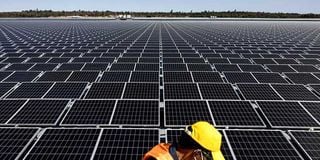Why consumers face stricter rules amid global glut in solar panels

Kenya is preparing new rules for solar panels amid a global glut.
Kenya plans to enforce stricter regulations of the solar energy sector in a bid to safeguard against the dumping of cheap yet low-quality systems amid a global glut of solar panels.
This will involve revoking the (Solar Photovoltaic Systems) Regulations, 2012, and replacing them with fresh ones that will see the country set a minimum validity period of five years for any solar energy component imported.
The regulations that are set to be gazetted by June this year come at a time when a host of countries are grappling with a glut in solar power components such as panels, with China being blamed for saturating the market with cheap yet low-quality parts.
Solar energy has in recent years turned out to be a go-to source of energy for homes and firms seeking alternative supplies of electricity in place of the erratic Kenya Power supply.
“They (regulations) are at the Attorney General’s chambers from where they will go to Parliament. We are hopeful that we will have them gazetted by June this year,” said Joseph Oketch, director of Renewable Energy at the Energy and Petroleum Regulatory Authority (Epra) said. “Any component that cannot last for five years is a danger to us. We need to have components from panels to batteries to serve for at least five years to allow one to recoup the costs and also take care of technological changes.”
The current regulations do not have a minimum service validity period for solar power systems, a loophole that has for years opened doors for the importation of below-par components.
But while Dr Oketch did not give more details on the upcoming regulations, Kenya is tightening the noose on manufacturers and vendors of solar power systems.
International Energy Agency (IEA), a Paris-based lobby that provides insights and policy directions on energy, estimates that the global supply of solar panels will reach 1,100 gigawatts by the end of this year, or three times the present forecast for demand.
The lobby says at the end of last year, an estimated 45 gigawatts of modules in the US and 90 gigawatts in the EU had piled up, nearly twice the forecast installations for 2024.
At the centre of the spike in supply is China, which has been accused of flooding the global market with cheap and low-quality panels, batteries, and other components of solar power systems.
The glut has triggered price cuts as suppliers race to clear excess stocks with a solar panel going for $11 cents at the end of last month, which is half the price it was going for in March last year.
The prices are expected to drop further in the coming months with buyers in markets such as Germany and Netherlands using the panels to fence their gardens.
French solar panel manufacturer Systovi says it is looking for buyers, amid “a sudden acceleration in Chinese dumping”.
The company is just one of the scorers across the world that are faced with excesses, which is likely to be felt in the local market in the coming months.
Kenya’s solar power generation capacity hit a fresh record last year following the commissioning of the 40-megawatt (MW) Alten Kenya plant.
Official data from Kenya Power shows that solar power generation jumped to a record 491.48 million kilowatt-hours (kWh) last year, representing a 28.1 per cent jump from 383.54 million kWh in 2022.
Solar power systems are also the go-to sources of energy in areas that are not linked to the national grid or where Kenya Power takes a long time to connect homes even after paying required charges.
Public and private universities in Kenya are also plan to install solar energy systems as a means of cutting operational costs further adding to the pool of those keen to fuel the demand for solar power systems. The switch offers a glimpse into the growing popularity of solar energy, which has in turn pulled in suppliers of the components, presenting a fresh headache to the government.
“We will restrict the kind of components that are shipped into the local market because we do not want to be faced with a fresh problem of electronic waste dumping. Solar energy should not in any way become a problem to our country,” Dr Oketch added.
Kenya, like other countries keen to harness the potential of untapped solar, is set to experience a supply boom in the coming months.
There are currently proposed regulations that seek to guide how homes with excess solar power will supply the surplus to the national grid, as the government moves in to capitalize on the growing popularity of solar energy.
Epra has in the past estimated solar potential in Kenya at 15000 Megawatts (MW) against an installed capacity of 367.5 MW as of the end of June last year.
Clean energy remains an integral part of Kenya’s vision in the next few years with the country eyeing a fully green grid by 2030. Solar and geothermal energy sources are at the center of this ambitious target.





